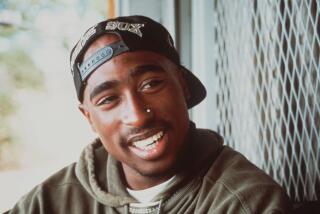Shakur Died as He Lived
- Share via
Regarding “Teenagers Grapple With Meaning of Shakur’s Death” (Metro, Oct. 7), I am a bit dismayed as to teens’ confusion over the seemingly obvious hows and whys of Tupac’s tragic death. His music--and I mean his entire body of music--was insightful but failed to deliver a concrete or productive message to young teens. His lyrics condemned the pain and despair of the street but simultaneously offered an unrepentant glorification of gang life, misogyny and brutality. Like his music, Tupac was a dichotomy; to a critical audience, he expressed disdain over their portrayal of him as an exponent of violence but nevertheless surrounded himself with a lifestyle that invited such criticism.
Today’s teens are bombarded by the imagery of young artists driving BMWs and Lexuses, playing with an assortment of automatic weapons and treating women as punching bags. Can their message overpower such imagery? Sadly, I am less likely to remember Tupac’s music and lyrics than his arrest for assaulting a video director in 1994, his alleged shooting of an Atlanta policeman, his assault on another rapper with a baseball bat, his conviction for sexual assault and for the words “Thug Life” etched across his abdomen.
Tupac’s end was written by Tupac himself, who chose to align himself with the violence that ultimately brought about his end. Rather than look to his music for answers, teens should take a closer look at his life and learn from his actions.
DAVID BAIZ
Editor
The Entertainment Monitor Magazine
Los Angeles
More to Read
The biggest entertainment stories
Get our big stories about Hollywood, film, television, music, arts, culture and more right in your inbox as soon as they publish.
You may occasionally receive promotional content from the Los Angeles Times.










